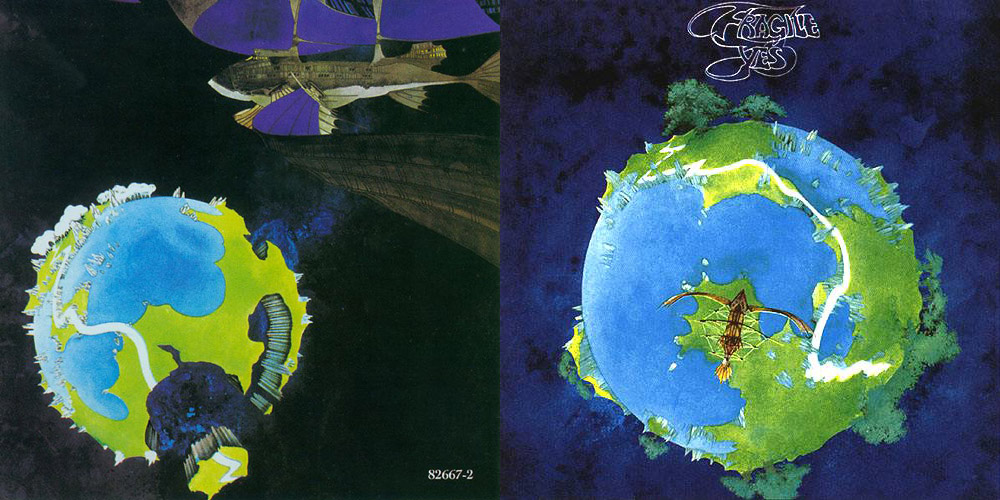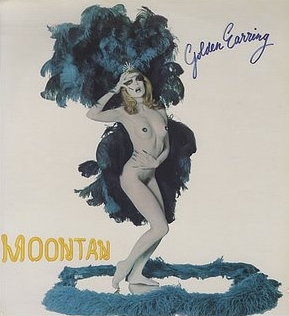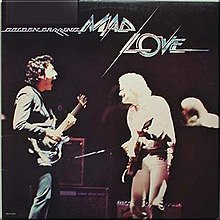Fragile by Yes (Atlantic 1971)
In and Around the Lake, Mountains Come Out of the Sky and They Stand There

According to drummer Bill Bruford, Yes were formed as a jazz band, while soprano Jon Anderson held the view that they should be the next Fifth Dimension. Initially, they were completed by former choirboy Chris Squire on bass, guitarist Peter Banks and classically trained keyboard player Tony Kaye. Whatever the band members' individual intentions, they combined to create a sound which uniquely was progressive from the outset, blending The Beach Boys, The Beatles, Simon & Garfunkel and others with their own developing instrumental dexterity. After two promising, experimental albums (Yes in 1969 and Time and a Word in 1970), Banks, although a fine guitar player, departed to be replaced by Steve Howe from Tomorrow. Immodestly declaring that he was joining musicians of equal strength, Howe nevertheless complemented Anderson perfectly and the band found their style on The Yes Album (Atlantic 1971). Engineer and long term collaborator, Eddie Offord, switched to production at the time of The Yes Album. He produced their best known albums and remained until Relayer (1974), but assisted with Drama (1980) and Union (1991). Offord, also engineered albums by ELP at this time and went on to produce David Sancous & Tone, Pallas, Utopia and others. For Fragile (Atlantic 1971), Kaye was replaced by Rick Wakeman from The Strawbs and almost everything was in place for the album . . .
I should point out that my first introduction to Yes was on Sounding Out, a BBC TV music documentary series shown on weekday mornings during the school summer holidays. By then Rick Wakeman was keyboard player and already sharing amusing anecdotes. I recall another episode featured Stephen Stills. Soon after, I heard Roundabout on weekend radio, blissfully unaware that it was a radio edit, until I bought Fragile in a WH Smith's sale a few years later. It came in a gatefold cover with Roger Dean artwork, lyrics and a booklet containing photographs of the band members. Most notable is Steve Howe with his considerable collection of guitars arranged in a circle.
Fragile, in its original vinyl form, was not made up entirely of Yes band tracks. Instead, it consisted of four band tracks, two on each side, among which are four short solo pieces, one by each member of the group. So, between Roundabout and South Side of the Sky, on side one, are Wakeman's Cans and Brahms and Anderson's We Have Heaven. Bruford's Five Per Cent for Nothing is out on a limb, opening side two, followed by the band's Long Distance Runaround. Between this and Heart of the Sunrise are Squire's The Fish and Steve Howe's Mood for a Day. Incredibly, Fragile was recorded and released in one month (November 1971). Thus:
Fragile Tracklist
Side One
1. Roundabout (8:30)
2. Cans and Brahms (Extracts from Johannes Brahms' 4th Symphony in E Minor, Third Movement) by Rick Wakeman (1:38)
3. We Have Heaven by Jon Anderson (1:40)
4. South Side of the Sky (8:02)
Side Two
1. Five Per Cent for Nothing by Bill Bruford (0:35)
2. Long Distance Runaround (3:30)
3. The Fish (Schindleria Praematurus) by Chris Squire (2:39)
4. Mood for a Day by Steve Howe (3:00)
5. Heart of the Sunrise (11:27)
2003 Remaster Bonus Tracks
10. America W. by Paul Simon (10:33)
11. Roundabout (Early Rough Mix) (8:35)
Roundabout begins with a single, rising note, which becomes a folk-inspired classical guitar into, but soon develops into Squire's propulsive, melodic bass sound. Rick Wakeman's keyboards are fully formed and it is as though he has been a member of the group from the outset. The song has various vocal parts, the backing voices shared between Jon Anderson and Chris Squire, while Roundabout's lyrics are concerned with an occasion when the band were travelling in a van, from Scotland to the north of England, through a cold mountain and lake landscape. Anderson's dry but sweet vocal delivery, the surreal lyrics and the sublime melody merge to produce a glorious piece of music of which The Beatles would have been proud. Unlike the 7" single edit, there is a bass-led instrumental passage at around 3:20 minutes and the second half of the track has such a commanding keyboard solo from Wakeman, it is unsurprising that almost overnight he became the most famous musician in the band.
Rick Wakeman's solo, Cans and Brahms, on which he plays all the parts on keyboards, sounds pleasant, but should have been part of a longer track or discarded. The same applies to Jon Anderson's We Have Heaven, on which he sings all the harmonies and plays instruments. The solo tracks cry out for the band and show a lack of cohesiveness in Yes.
Southside of the Sky does not sound unlike Roundabout in conjuring up another journey through a cold, mountainous landscape. However, it is quicker and more urgent, with Jon Anderson showing he can rock and Steve Howe playing frantically as though he cannot hear the rest of the band. In this respect, it predates his playing on Going for the One, but unlike Yes's late seventies work, this piece hangs together brilliantly. There is a Wakeman acoustic piano section at just over two minutes, balancing the energetic intro, followed by a multi-part harmony segment from Anderson, Squire and Howe. Before closing the song and side one of the vinyl, we are back to a fast passage, which fades with soloing from Howe.
Side two of the vinyl opens/opened with Five Per Cent for Nothing, where the band follow Bill Bruford's drumming, and the least successful of the solo pieces - such that it should have been left off the album. Long Distance Runaround has a jazzy feel but this is not jazz rock; it is full blown progressive rock music but with sprightly, complex and intricate playing. When Rick Wakeman invited Jon Anderson to sing on his solo album 1984, he said in a BBC radio interview, "Jon always gives a performance even when he is singing in the studio." A performance is in evidence here along with interesting lyrics, despite the criticism Anderson later took for his efforts.
Chris Squire's piece The Fish, the most successful of the solo works, flows naturally from the jazz-feel of Long Distance Runaround, thanks to Bill Bruford's inventive drumming, which combines well with the bass and demonstrates the excellent clarity of the remastered version of Fragile. Squire plays everything, apart from drums, on the bass guitar, which is multi-tracked. One cannot help thinking that Squire would make a more than competant lead guitarist if he chose to switch responsibilites. Steve Howe's Mood for a Day is more folk-inspired classical guitar, which, along with his work on the title track, may have led to Wakeman's observation that the Americans thought Yes were an obscure English folk group.
Last track on the album, Heart of the Sunrise opens with a group intro, but evolves into a typically distinctive Squire bassline which is joined by Wakeman's haunting mellotron. Squire's passage is fast, multi-tracked and fairly lengthy. Jon Anderson sings quietly, except for the later SHARP - DISTANCE passages - accentuated with upper-case letters in the album cover lyrics. His singing is really beautiful, showing why he one of the best progressive rock singers. Not to be outdone by Squire, Wakeman joins with some speedy synthesizer, again with a jazz feel. Heart of the Sunrise, although followed by a We Have Heaven reprise, is a fitting conclusion to the flawed masterpiece that is Fragile.
The remastered version of Fragile has two unusually high quality bonuses in Simon and Garfunkel's America and an early rough mix of Roundabout. America was recorded for an Atlantic sampler and released on Yesterdays, a compilation of early single a and b-sides with a distinctive Roger Dean cover. Coming from the Fragile-era, America was slightly out of place on the compilation. Here, it fits almost perfectly; the only discrepancy being that it is a cover version - a rarity for the classic-era Yes. However, the energy and dexterity of the playing, make it as strong as anything on the album and a far more satisfying piece than the short solos. Imagine if Jimi Hendrix played country or Mark Knopfler picked with dynamism and you would have Steve Howe's guitar workout from the halfway mark. Although a Simon and Garfunkel fan, when I think of America, it is this version which springs to mind. The early rough mix of Roundabout is not hugely different from the version which made it on to the original album, although Bill Bruford and Jon Anderson try out different ideas on percussion and vocal parts respectively. Chris Squire plays bass as though his life depends upon it, making this a surprisingly enjoyable bonus.
Although Fragile contains Yes's best song in Roundabout, more consistency was to come with their brilliant Close to the Edge album in the following year. Had the band put their collective talent into one more band track, instead of the five individual solo pieces, it would have competed with Close to the Edge as their best work. Ironically, a similar thing was said when the band split, following Relayer (Atlantic 1974), to concentrate on solo albums, before reconvening for Going for the One (Atlantic 1977) and the unsatisfactory Yes Tormato (Atlantic 1978).
Fragile Lineup
Jon Anderson: Lead vocals
Bill Bruford: Drums, percussion
Steve Howe: Electric and acoustic guitars, backing vocals
Chris Squire: Bass guitars, backing vocals
Rick Wakeman: Hammond organ, piano, RMI 368 electra-piano and harpsichord, mellotron, Moog synthesizer
Written August 2012













 Linear Mode
Linear Mode
